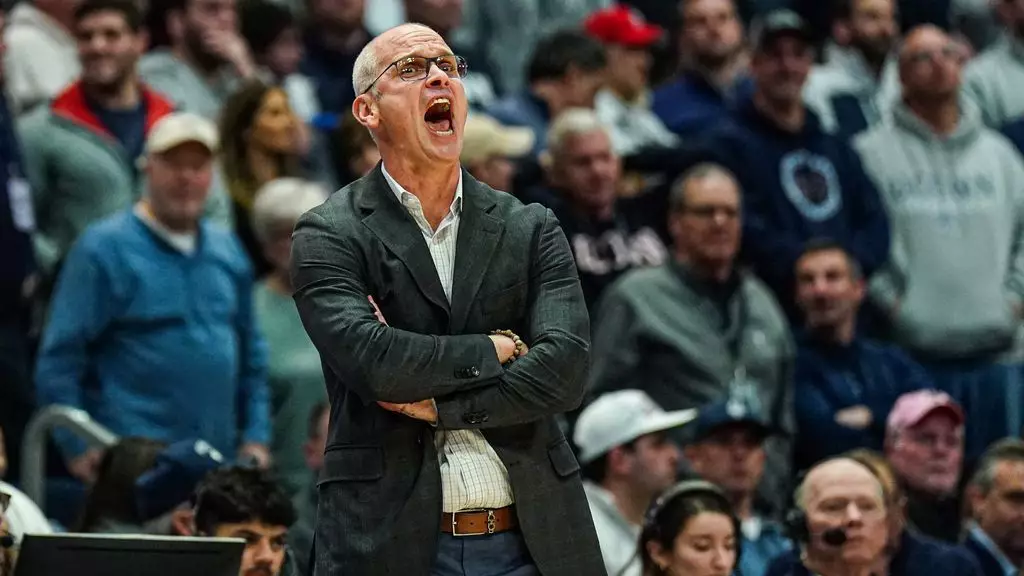Dan Hurley, the head coach of UConn’s basketball team, recently found himself at the epicenter of controversy after a volatile post-game outburst led to unfortunate media exposure. His regrettable comments about officiating following his team’s NCAA tournament exit not only underscored his emotional investment in the sport but also revealed a deeper, systemic issue within college athletics. Hurley’s remarks, specifically his colorful critique of officiating during an intensely emotional moment, highlighted an inherent flaw in how we expect coaches and athletes to always maintain decorum, especially in high-stakes environments.
The fervor surrounding college basketball creates a pressure cooker atmosphere that inevitably influences behavior. But is it fair to vilify coaches for their instinctive responses to adversity? While there are boundaries that should not be crossed, Hurley’s actions resonate with many who understand the deep-seated passion that drives individuals to this level of competition. The outburst, while regrettable, illustrated a noteworthy reality: coaches are human and prone to such passionate displays in the heat of battle.
The Hidden Impact of Regulation
What troubled me most about Hurley’s predicament, however, was not merely the comments made in frustration but the insistence that the media’s presence in emotional spaces necessitates a temperature check on all expressions of dissent. The arena where Hurley spoke—supposedly a private zone for competitors and their immediate entourage—was inadvertently transformed into a platform for public scrutiny. This further complicates the relationship between honesty and decorum in sports.
Coaches are burdened by the very regulations that purportedly intend to uphold the integrity of the sport. It’s a disheartening tension when a coach, passionate and invested, must suppress natural reactions under the pretense of professional decorum, particularly when those reactions stem from the unfairness of a loss that could have been avoided by more attentive officiating. In Hurley’s case, instead of focusing on the game’s outcomes, we are confronted with a narrative centered around an emotional misstep—a narrative that overshadows the accomplishments of UConn’s remarkable basketball journey over the last few years.
Communication Breakdown
The aftershocks of Hurley’s comments extended beyond regrets. The involvement of UConn’s director of men’s basketball communications, Bobby Mullen, added another layer to the unfolding situation. His instinct to intervene and suppress the narrative reflects the culture that often permeates college sports: one that prioritizes brand management over authenticity. In times of emotional turmoil, reactions should be real, raw, and, above all, human.
Mullen’s apology to the media person who recorded Hurley’s remarks was a necessary step but also illustrated an underlying fear within institutional sports. There is a growing sense that emotional honesty is discouraged—the acceptance of humanity in coaches and players seems to come second to maintaining a ‘clean’ public image. Instead of fostering environments where authentic expressions are allowed, institutions sometimes prioritize public relations over character.
The Price of Passion
It’s crucial to recognize the environment coaches operate within, one that demands victories against formidable odds. In constraining emotional authenticity, the sport risks creating a facade that can alienate both athletes and supporters, leading to superficial interactions. Hurley’s admission that he wished he could change his outburst reflects the heavy burden coaches carry—an obligation to represent not just themselves, but also their programs.
As a proponent of center-wing liberalism, I find it disheartening that accountability often hinges on outward appearances rather than genuine emotional expressions. The tension between pressure and performance is palpable, and as fans and observers, we must cultivate an awareness that this dilemma runs deeper than any single incident.
Emotional displays, even frowned upon ones, reflect the realities of competitive sports. Rather than vilifying passionate responses, we should seek to understand them as manifestations of dedication, commitment, and the complexities involved in coaching young athletes. The reflective arc initiated by Hurley’s remarks can serve as a catalyst for discussions surrounding the expectations placed on officials, coaches, and the very fabric of college sports culture.

